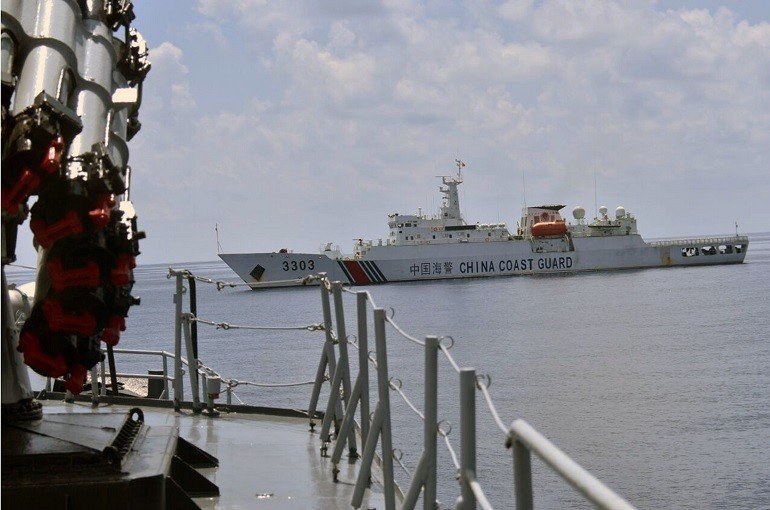Popular Reads
Top Results
Can't find what you're looking for?
View all search resultsPopular Reads
Top Results
Can't find what you're looking for?
View all search resultsKeeping Chinese fishing vessels from Natuna, defending people’s welfare
Change text size
Gift Premium Articles
to Anyone
 China Coast Guard ship 3303 passes near the Imam Bonjol warship 383 as the Indonesian Navy pursues the Han Tan Cou fishing vessel entering Indonesia's Natuna waters on June 17. The Navy caught the China-flagged boat suspected of illegal fishing in Indonesian waters. (Antara/Photo Courtesy of The Navy's Western Region Fleet Command (Koarmabar))
China Coast Guard ship 3303 passes near the Imam Bonjol warship 383 as the Indonesian Navy pursues the Han Tan Cou fishing vessel entering Indonesia's Natuna waters on June 17. The Navy caught the China-flagged boat suspected of illegal fishing in Indonesian waters. (Antara/Photo Courtesy of The Navy's Western Region Fleet Command (Koarmabar))
T
he latest incidents in the North Natuna Sea should serve as another wake-up call for the government to immediately and expediently improve the country’s naval and other related capabilities to safeguard the sovereign rights of the nation, particularly on the southern fringe of South China Sea.
Still fresh in our minds is the skirmish between warship KRI Imam Bonjol and a Chinese fishing vessel in 2016, after which President Joko “Jokowi” Widodo held a meeting on board the warship to assert Indonesia’s rights in the Exclusive Economic Zone (EEZ). An integrated military base was then built on the Natuna Islands to deter any threat from the South China Sea. Late last year, the military presence was further strengthened after Jokowi inaugurated three Joint Defense regional Commands (Kogabwilhan), one of which is headquartered in the Riau Islands provincial capital of Tanjung Pinang and oversees western Indonesia.
The military buildup, however, remains unable to prevent or mitigate encroachments by foreign fishing vessels in the North Natuna Sea, the most recent of which was reported by local fishermen as early as Oct. 26, 2019, and picked up by local media over two months later.
Only then did the issue receive attention from all parties. It is quite disturbing that such violations took that long to be addressed. There should be a mechanism that ensures immediate response from the authorities.
It seems the government has been caught off-guard with the encroachment upon the Natuna waters, as the latest incidents have evinced. Unlike in the previous cases, the latest events saw the Chinese fishing fleet closely escorted by the country’s Coast Guard vessels. In the past, the white-hulled vessels would stay behind and only appear when Indonesian ships took legal action against the fishing fleet.
The official report said the Chinese fishing fleet was about 130 nautical miles from Natuna Island. This means they encroached a significant 70 nautical miles from where they should have stopped unless they had proper documentation and licenses to fish inside the Indonesian EEZ.
The incidents clearly showed China’s stronger assertiveness in claiming the region using the non-internationally recognized nine-dash line and the “traditional fishing ground” argument. Indonesia’s EEZ, on the contrary, is delineated according to the United Nations Convention on the Law of the Sea (UNCLOS).
The incursions came about a week after the Indonesia Onward Cabinet was sworn in. China is perhaps aware that a tough figure like former maritime affairs and fisheries minister Susi Pudjiastuti, who was prominent for sinking foreign vessels caught poaching in Indonesian waters, is no longer in Jokowi’s Cabinet.
The way the government responded to the latest encroachment reflected a lack of unity at the highest level — even after a coordination meeting. Institutions responsible for maintaining Indonesia’s sovereignty have instead sent confusing signals to the public, both at home and outside.
While the Foreign Ministry took strict action by summoning the Chinese ambassador to Indonesia, other officials opted for a soft and amicable approach, citing China’s role as a strategic trade and investment partner.
Bilateral relations and trade and investment opportunities matter, but the law must be upheld and enforced.
Therefore, Jakarta must assert its presence in the North Natuna Sea and exercise its sovereign rights in its EEZ.
The Indonesian Navy (TNI AL) has sent six additional warships to patrol the area, but this is a somewhat asymmetrical showdown between the Indonesian naval gray hulls and Chinese Coast Guard white hulls. It is true that the TNI AL has constabulary duties in addition to defense and diplomacy, but sending white hulls would be a better choice.
To prevent future encroachment, the Maritime Security Agency (Bakamla) must be strengthened and empowered. Unfortunately, the government regulation that elevates the agency to Indonesia’s coast guard has been stalled due to resistance from the Transportation Ministry which oversees the Indonesian Sea and Coast Guard Unit (KPLP).
Bakamla has already commissioned one 110-meter and three 80-m cutters — all made locally — to safeguard Indonesian waters, but it needs a whole lot more. So does the TNI AL, which is operating an inadequate number of 90-m corvettes and 113-m and 105-m frigates. Indonesia also needs larger ships that can stay on station longer and carry surveillance helicopters.
Such procurement could be a boon for the national ship-building industry, especially if the government provides a common design for both the TNI AL and Bakamla. Such commonalities would be beneficial as Bakamla also uses TNI AL personnel to man their cutters.
The constant presence of Indonesian vessels and other assets, such as surveillance and maritime patrol aircraft, in the North Natuna Sea will allow the authorities to rapidly respond to any trespasses in the future.
The idea of bringing fishermen from other parts of the country to fish in the North Natuna Sea should be considered to show Indonesia’s presence there. It requires careful planning and cooperation with local fishermen so as not to trigger harsh competition between them.
Diplomatic measures alone will not suffice to resolve the dispute with China, which claims the North Natuna Sea as its traditional fishing grounds. Resorting to diplomatic channels will only give China the upper hand. Beijing has successfully militarized contested islands and other sea features by turning them into artificial islands.
Until China, as a party to UNCLOS, fully adheres to the law of the sea, Indonesia should always be ready to defend its national interests and people’s welfare.










